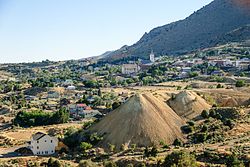Virginia City
| Virginia City, Nevada | |
|---|---|
| Census-designated place | |

View of Virginia City, July 2016
|
|
| Motto: "Step Back in Time" | |
| Location within the state of Nevada | |
| Coordinates: 39°18′37″N 119°38′58″W / 39.31028°N 119.64944°WCoordinates: 39°18′37″N 119°38′58″W / 39.31028°N 119.64944°W | |
| Country | United States |
| State | Nevada |
| County | Storey |
| Area | |
| • Total | 0.8 sq mi (2.2 km2) |
| • Land | 0.8 sq mi (2.2 km2) |
| • Water | 0 sq mi (0 km2) |
| Elevation | 6,150 ft (1,874 m) |
| Population (2010) | |
| • Total | 855 |
| • Density | 1,000/sq mi (390/km2) |
| Time zone | Pacific (PST) (UTC-8) |
| • Summer (DST) | PDT (UTC-7) |
| FIPS code | 32-80000 |
| GNIS feature ID | 0856420 |
Virginia City is a census-designated place (CDP) that is the county seat of Storey County, Nevada. It is part of the Reno–Sparks Metropolitan Statistical Area.
Virginia City sprang up as a boomtown with the 1859 discovery of the , the first major silver deposit discovery in the United States, with numerous mines opening. At the city's peak of population in the mid-1870s, it had an estimated 25,000 residents. The mines' output declined after 1878, and the city itself declined as a result. As of the 2010 Census the population of Virginia City was about 855, with 4,000 living in Storey County.
Peter O'Riley and Patrick McLaughlin are credited with the discovery of the Comstock Lode.'s name was associated with the discovery through his own machinations. According to folklore, James Fennimore, "Old Virginny Finney," christened the town when he tripped and broke a bottle of whiskey at a saloon entrance in the northern section of Gold Hill, soon to become Virginia City.
In another story, the "Ophir Diggings", were named in honor of "Old Virginny" by the miners, in recognition of James Finney being "one of the first discoverers of that mining locality, and one of the most successful prospectors in that region." Finney "was the best judge of placer ground in Gold Canyon", locating the quartz footwall of the Ophir on 22 Feb. 1858, located the placers on Little Gold Hill on 28 Jan. 1859, and the placers below Ophir in 1857.
After the discovery of the Comstock Lode in 1859, the town developed seemingly overnight on the eastern slopes of Mount Davidson, perched at a 6200-foot elevation. Below the town were dug intricate tunnels and shafts for silver mining. The Comstock Lode discovery and subsequent growth of Virginia City was unequaled by the history of other precious metal discoveries. By 1876 Nevada produced over half of all the precious metals in the United States. The Comstock produced silver and gold ore valued at hundreds of thousands of dollars. The wealth supported the Northern cause during the American Civil War and flooded the world monetary markets, resulting in economic changes.
...
Wikipedia

